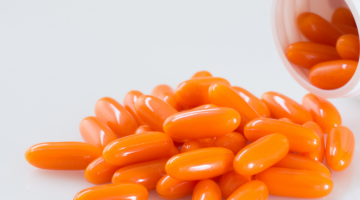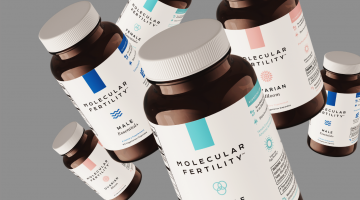CoQ10 During Pregnancy
We discuss various nutrients and dietary supplements in this article that may or may not be helpful. If you purchase recommended products, services, or treatments, it may benefit CNY Fertility financially. Read more about our financial relationships here. The supplements discussed in this article are not intended to treat, cure, or prevent any disease. If you are pregnant, take any medications, or have been diagnosed with a medical condition, consult with a healthcare provider before taking any dietary supplement.

Coenzyme Q10 (CoQ10) is a naturally occurring biomolecule that is essential for the health of all human cells, tissues, and organs. CoQ10 can be taken as a dietary supplement to combat increasing age and certain medical conditions that can cause CoQ10 levels to drop. Because many people take CoQ10 for fertility, they often want to know, can you take CoQ10 during pregnancy?
While research surrounding CoQ10 and pregnancy is limited, most studies indicate CoQ10 is usually safe to take during pregnancy. However, as with all medications and supplements, you should consult your doctor to ensure that taking CoQ10 is safe for you. Your doctor has knowledge of preexisting medical conditions, allergies, and the medicines you take, which could impact Co Q10’s safety.
This article will review available research on CoQ10 during pregnancy and its safety.
What is Co Q10
Coenzyme Q10 (CoQ10), also known as ubiquinone, is a naturally occurring biomolecule that is present in every cell in the human body. CoQ10 functions as a potent antioxidant and helps generate energy in all cells. As such, CoQ10 is essential for the health of all human cells, tissues, and organs.
The body can synthesize CoQ10, but levels tend to decline with age. While CoQ10 is a nutrient that is found in certain foods, it is usually found in relatively low concentrations. Because of this, CoQ10 is often taken as a dietary supplement.
CoQ10 supplementation has many practical applications and has been shown to support the health of those with the following medical conditions:
- Heart conditions
- Parkinson’s disease
- Diabetes
- Migraines
- Statin-induced myopathy (Co Q10 may help to ease muscle weakness and pain caused by statins)
- Male and Female Fertility.
General Safety of CoQ10
When taken as directed, CoQ10 is viewed as generally safe and has few associated side effects. As referenced above, there is plenty of research available that has shown CoQ10 may provide a wide array of health benefits.
Since CoQ10 levels decrease with age, most adults may benefit from a CoQ10 supplement. The potential side effects of CoQ10 are not only rare, but they are usually mild.
Mild side effects include:
- upset stomach
- decreased appetite,
- nausea
- vomiting
- diarrhea
When evaluating potential CoQ10 supplements, be sure to check for products with proven safety and purity as the FDA does not strictly regulate CoQ10 supplements. .
CoQ10 Saftey During Pregnancy
Research indicates that CoQ10 has low toxicity and requires long exposure to high dosages to produce possibly adverse effects. In addition, studies have shown that CoQ10 usually does not cause serious adverse effects in humans.
While CoQ10 supplementation should be safe during pregnancy, there isn’t much available research on the topic. Therefore, we recommend that anyone considering CoQ10 supplementation during pregnancy consult with a healthcare provider prior to starting supplementation.
CoQ10 During Pregnancy – Reducing Inflammation and Combatting Adverse Pregnancy Outcomes
Studies have shown that CoQ10 supplementation may help to reduce inflammation and oxidative stress in the body, especially in those with low CoQ10.
Research shows that inflammation can cause preterm birth.
It is theorized that by combatting maternal and fetal inflammation, CoQ10 may help to prevent these adverse pregnancy outcomes.
In fact, some studies have shown that there is a correspondence between low CoQ10 levels and spontaneous abortion.
CoQ10 and Pre-eclampsia During Pregnancy
For some women, CoQ10 may provide benefits and help to protect against certain medical conditions that could occur during pregnancy, like pre-eclampsia.
Pre-eclampsia is a pregnancy complication that usually emerges around 20 weeks of pregnancy. It is characterized by high blood pressure and signs of damage to another organ system. If left untreated, pre-eclampsia can cause serious and even fatal complications to the mother and her baby.
In one study, researchers measured the effects of CoQ10 supplementation on women at an increased risk of developing pre-eclampsia. Women were split into a 200 mg CoQ10 treatment group and a placebo group. They received treatment from 20 weeks of pregnancy until delivery.

The overall rate of pre-eclampsia in the study was 20%. 25.6%of the placebo group developed pre-eclampsia, compared with only 14.4% of the CoQ10 treatment group women.
Researchers determined that the difference between the two groups was significant and that supplementation with CoQ10 reduced the risk of developing pre-eclampsia.
CoQ10 and Risk of Cholestasis During Pregnancy
Cholestasis of pregnancy is a liver problem that causes the normal flow of bile from the gallbladder to be stopped or slowed. Due to the serious health consequences that cholestasis can cause to the mother and the fetus, it is considered a high-risk condition. Cholestasis can increase the risk for fetal distress, preterm birth, or stillbirth.
Research has shown that women who experience cholestasis have a significant decrease in CoQ10 levels. Studies have found that a fetus from a mother who experienced cholestasis is at greater risk due to oxidative damage.
The accumulation of bile acids caused by cholestasis contributes to an imbalance of reactive oxygen species and antioxidant defenses. This imbalance can cause an increase in the oxidative stress experienced by the fetus.
As previously mentioned, CoQ10 functions as a strong antioxidant that can help to reduce oxidative damage.
Other research has shown that CoQ10 supplementation may reduce cholestasis by promoting a favorable redox environment in the liver.
CoQ10 and Risk of Miscarriage During Pregnancy
As mentioned above, CoQ10 may help to reduce the chances of miscarriage and other adverse pregnancy outcomes. However, there are some reports indicating that CoQ10 may contribute to negative pregnancy outcomes.
One study found that heightened Co Q10 levels in the amniotic fluid (fluid surrounding the fetus in the abdomen) during the fourth to sixth month of pregnancy may be a marker of future complications during pregnancy and birth.
It is important to note that heightened CoQ10 levels were only viewed as a marker and not a cause of possible future complications. This study also produced evidence that CoQ10’s antioxidant properties may help to reduce harmful oxidative stress and restore homeostasis. The study recommended that the possible negative side effects of CoQ10 during pregnancy need to be further investigated.
Recommended CoQ10 and Ubiquinol Supplements
If you’ve spoken to a provider and are looking for a high-quality CoQ10 supplement, we at CNY Fertility recommend the Molecular Fertility brand. Our team of doctors, endocrinologists, and fertility specialists at CNY Fertility created Molecular Fertility, our own line of supplements specifically designed to help support fertility. Molecular Fertility supplements are made with premium ingredients and are designed to support maternal health prior to and during pregnancy.
Molecular Fertility’s CoQ10 supplements were created with the renowned Swiss biotech company VESIsorb. The supplements contain a patented nutrient delivery system clinically demonstrated to provide 6 times more absorption and bioavailability than traditional CoQ10 supplements.
Molecular Fertility’s CoQ10 as Ubiquinol supplement, which is CoQ10 in its active form, contains the same VESIsorb system for improved absorption and is designed to help support health and fertility, especially for those over 35.
The Bottom Line About Taking CoQ10 While Pregnant
CoQ10 has low toxicity and may present many potential benefits to women whether they are trying to get pregnant or are pregnant.
However, the conflicting data and lack of studies on CoQ10 during pregnancy are why most physicians determine CoQ10 to be “mostly safe” for pregnant women.
As with all medications or supplements, you should consult with your doctor before starting anything new. If you are already taking medications, have health concerns, or are pregnant, then it is especially important to speak with your doctor.





